Audit Request Letter
[Your Name]
[Your Address]
[City, State, ZIP Code]
[Email Address]
[Phone Number]
[Date]
[Recipient's Name]
[Recipient's Title/Position]
[Company/Organization Name]
[Address]
[City, State, ZIP Code]
Subject: Request for Audit
Dear [Recipient's Name],
I hope this letter finds you well. I am writing to formally request an audit of [Company/Organization Name]'s financial and operational records. As a stakeholder/investor/member/customer, I believe it is essential to ensure transparency and compliance with relevant regulations and standards.
The purpose of this audit is to gain a comprehensive understanding of the company's financial health, internal controls, and adherence to industry best practices. It will enable us to assess the accuracy and reliability of the financial statements and other key operational processes. Additionally, the audit will help identify areas of improvement and potential risks that may impact the organization's overall performance.
To conduct the audit, we kindly request the following information:
1. Financial Statements: Please provide the audited financial statements for the past [number of years] years, including balance sheets, income statements, and cash flow statements.
2. Supporting Documentation: Any relevant documentation supporting the financial statements, such as receipts, invoices, bank statements, and expense reports.
3. Internal Controls: Details of the company's internal control systems and processes, including policies related to finance, accounting, and data security.
4. Compliance Records: Information regarding compliance with legal and regulatory requirements specific to your industry.
5. Operational Reports: Reports related to the company's operations, production, sales, and any other significant activities.
6. Any Previous Audit Reports: If applicable, please provide the most recent audit report and information on the steps taken to address any findings.
We assure you that all information obtained during the audit process will be treated with the utmost confidentiality and used solely for the purposes of the audit. Our audit team comprises experienced professionals with a proven track record in conducting thorough and impartial audits.
Once we receive the necessary documentation and information, we will work closely with your team to schedule the audit at a mutually agreeable time. Upon completion of the audit, we will share the findings and recommendations with the appropriate parties within [Company/Organization Name].
Please acknowledge receipt of this letter and confirm your agreement to proceed with the audit process. If you have any questions or require further clarification, please do not hesitate to contact me at [your phone number] or [your email address].
Thank you for your attention to this matter. We look forward to working together to ensure the integrity and efficiency of [Company/Organization Name]'s operations.
Sincerely,
[Your Name]
Formal Audit Request Letter
Subject: Request for Audit of Financial Statements
Dear [Auditor’s Name],
I am writing to formally request a comprehensive audit of our financial statements for the fiscal year [Year]. As part of our commitment to transparency and compliance with regulatory requirements, it is essential that an independent audit be conducted.
Please provide us with your available schedule and the necessary documentation or information you require to initiate the audit process. We look forward to working with your team and ensuring a thorough and accurate review.
Sincerely,
[Your Name]
[Your Position]
[Company Name]
Internal Audit Request Letter
Subject: Request for Internal Audit
Dear [Internal Audit Manager],
To ensure adherence to our internal policies and procedures, we request an internal audit of the [Department/Division Name] covering the period from [Start Date] to [End Date]. This audit will help identify areas for improvement and ensure compliance with our organizational standards.
Kindly schedule the audit at your earliest convenience and advise on any documents or records required. Your cooperation is appreciated in maintaining operational efficiency and accountability.
Best regards,
[Your Name]
[Your Position]
[Department Name]
Provisional Audit Request Letter
Subject: Provisional Request for Audit Planning
Dear [Auditor’s Name],
We would like to provisionally request an audit of our accounts for the upcoming quarter. This request is subject to confirmation of your availability and the finalization of audit timelines.
Please advise on preliminary requirements and any documents we should prepare in advance. We look forward to your guidance in scheduling and conducting the audit efficiently.
Sincerely,
[Your Name]
[Your Position]
[Company Name]
Casual Audit Request Email
Subject: Audit Request
Hi [Auditor's Name],
I hope this message finds you well. We would like to schedule an audit of our accounts for [Period/Project]. Could you please let us know your availability and the documentation needed?
Looking forward to your response.
Best regards,
[Your Name]
[Position]
[Company Name]
Urgent Audit Request Letter
Subject: Urgent Request for Audit
Dear [Auditor’s Name],
Due to recent discrepancies identified during our internal review, we request an urgent audit of the [Specific Department/Project]. Timely intervention is critical to ensure accuracy and compliance with financial regulations.
We would appreciate your immediate attention and guidance regarding the documentation required to initiate the audit.
Sincerely,
[Your Name]
[Position]
[Company Name]
Official Audit Request Letter for Compliance
Subject: Request for Compliance Audit
Dear [Auditor/Authority Name],
As part of our commitment to regulatory compliance, we formally request a compliance audit of our operations for the period [Start Date] to [End Date]. The audit will assist in verifying adherence to statutory and organizational standards.
Please provide instructions regarding the necessary documentation and schedule. We value your professional assistance in ensuring our processes meet required compliance standards.
Sincerely,
[Your Name]
[Position]
[Company Name]
Funny/Lighthearted Audit Request Note
Subject: Friendly Audit Request
Hi [Auditor’s Name],
We hope you’re ready for a little detective work! We’d like to request an audit of our accounts for [Period]. We promise we haven’t hidden any surprises, but we could use your keen eye to double-check everything.
Please let us know your availability and any documents you need. Looking forward to a smooth and (hopefully) fun audit experience!
Best,
[Your Name]
[Position]
[Company Name]
Internal Departmental Audit Request Letter
Subject: Request for Departmental Audit
Dear [Internal Auditor/Manager],
We request an internal audit for the [Department Name] for the period [Start Date] to [End Date]. This audit aims to assess compliance with internal controls and improve operational processes.
Please advise on the schedule and the documentation required to facilitate a thorough review. Your assistance is appreciated.
Sincerely,
[Your Name]
[Position]
[Company Name]
Preliminary Audit Request Letter
Subject: Preliminary Audit Request
Dear [Auditor’s Name],
We are considering an audit of our financial and operational records and would like to initiate a preliminary discussion. Please advise on your availability to review our records and outline requirements for a full audit.
Your guidance will help us prepare for an efficient and accurate audit process.
Best regards,
[Your Name]
[Position]
[Company Name]
What / Why: Understanding Audit Request Letters
An Audit Request Letter is a formal or informal document used to request a review of financial, operational, or compliance records by an internal or external auditor. Its purposes include:
- Ensuring compliance with regulatory or internal standards.
- Identifying discrepancies or areas of improvement.
- Documenting formal requests for audit engagement.
- Facilitating proper scheduling and preparation for the audit process.
Who: Who Should Send an Audit Request Letter
- Company executives (CEO, CFO) requesting external audits.
- Internal department heads or managers requesting departmental audits.
- Compliance officers requesting audits for regulatory adherence.
- Project managers requesting audits on specific projects or financial activities.
Whom: Who Receives an Audit Request Letter
- External auditors (audit firms, independent professionals).
- Internal audit teams within the organization.
- Regulatory authorities in case of statutory compliance audits.
- Department heads or team leads (for interdepartmental audits).
When: Situations Requiring an Audit Request Letter
- Annual financial statement audits.
- Internal audits to ensure process efficiency.
- Compliance audits for regulatory adherence.
- Project-specific or departmental audits.
- Urgent audits due to detected discrepancies.
- Preliminary discussions before finalizing audit plans.
How: Writing and Sending an Audit Request Letter
- Identify the type of audit and scope of work.
- Choose the appropriate tone (formal, casual, urgent).
- Include necessary details: period, department, or project.
- Request auditor availability and required documents.
- Use professional formatting and clear language.
- Send via email or printed letter depending on formality.
- Follow up if no acknowledgment is received within a reasonable timeframe.
Requirements and Prerequisites
- Comprehensive records of financial transactions or operational data.
- Knowledge of regulatory or internal standards.
- Contact details of auditors or audit team.
- Approval from management if necessary.
- Clear definition of audit scope and objectives.
Formatting: Best Practices for Audit Request Letters
- Length: 1–2 pages maximum, concise and structured.
- Tone: Formal for official audits, casual for internal preliminary requests.
- Structure:
- Subject line
- Salutation
- Purpose of the audit
- Period or department concerned
- Required documents or preparation
- Request for schedule or confirmation
- Closing with signature
- Include attachments if necessary (summary reports, prior audit results).
After Sending / Follow-up
- Confirm receipt via email or acknowledgment.
- Provide any additional documents requested by the auditor.
- Coordinate schedules and access to records.
- Maintain records of correspondence for compliance purposes.
Pros and Cons of Sending an Audit Request Letter
Pros:
- Establishes a formal record of audit request.
- Facilitates structured planning and preparation.
- Ensures transparency and accountability.
Cons:
- May require follow-up if not acknowledged promptly.
- Can highlight areas of concern prematurely to external parties.
- Incorrect or incomplete requests may delay the audit process.
Tricks and Tips for Effective Audit Requests
- Clearly specify the period, department, or project for audit.
- Attach relevant documents to facilitate audit preparation.
- Use precise and professional language to avoid ambiguity.
- Follow up politely to confirm scheduling and readiness.
- Specify deadlines if audits are time-sensitive.
Mistakes to Avoid
- Omitting crucial details like period or scope.
- Using informal language in official audits.
- Sending requests without management approval.
- Not specifying document requirements, causing delays.
- Ignoring the auditor’s guidelines or availability.
Elements and Structure of an Audit Request Letter
- Subject line clearly indicating the audit request.
- Salutation addressing the auditor or relevant authority.
- Purpose and scope of the audit.
- Timeframe or period covered.
- Departments or projects concerned.
- List of documents or preparation required.
- Request for schedule, availability, or confirmation.
- Closing statement with appreciation.
- Signature, designation, and organization.
- Attachments if applicable.
Does it Require Attestation or Authorization?
- External audits often require official authorization from management (CEO/CFO).
- Letters may be on company letterhead for validity.
- Statutory audits may require signatures from authorized signatories or compliance officers.
- Internal departmental audits usually require approval from the department head or internal audit manager.
Compare and Contrast: Audit Request Letters vs Informal Requests
- Formal Audit Request Letters:
- Sent to external auditors or regulatory bodies.
- Use professional language and structured format.
- Often require management authorization.
- Informal/Internal Requests:
- Sent within the organization to internal audit teams.
- May use casual language and simple structure.
- Focused on internal compliance and process improvements.
FAQ About Audit Request Letters
Q: Can an audit request be made via email?
A: Yes, especially for internal or preliminary requests, but official audits usually require formal letters.
Q: Is management approval necessary for all audits?
A: For external or statutory audits, yes. Internal audits may vary depending on organizational policy.
Q: What documents should be included?
A: Financial statements, transaction records, prior audit reports, and any relevant internal documents.
Q: How soon should a response be expected?
A: Typically within a week for internal audits; external audits may take longer depending on schedules.

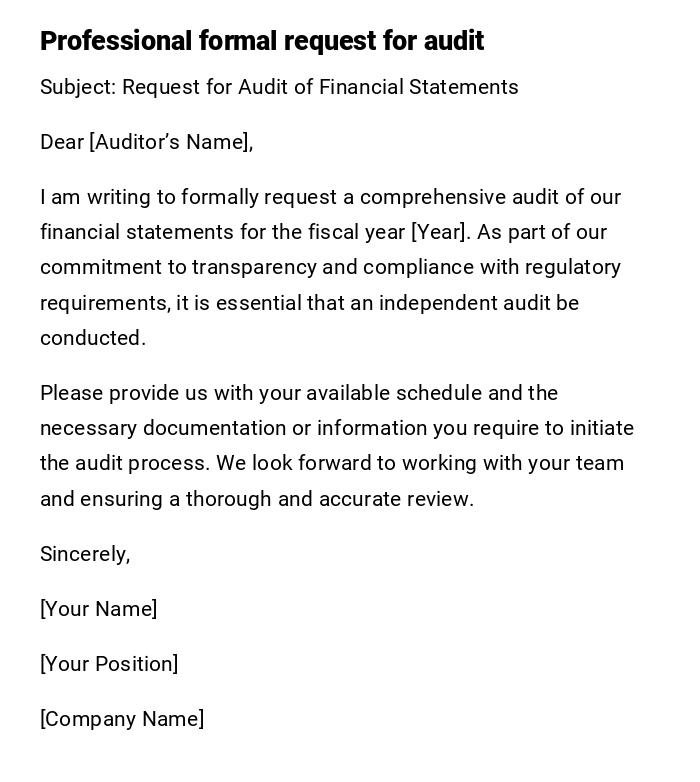
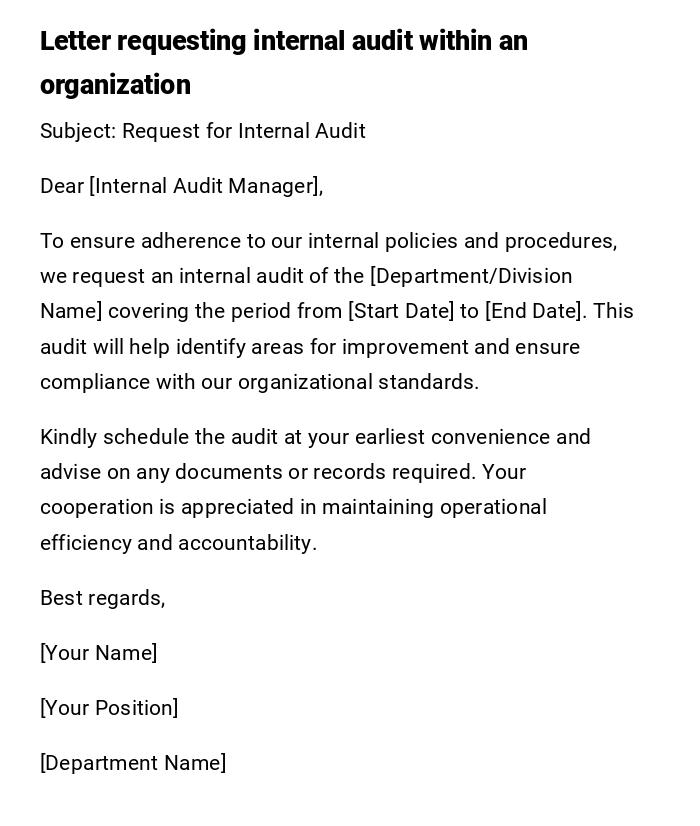
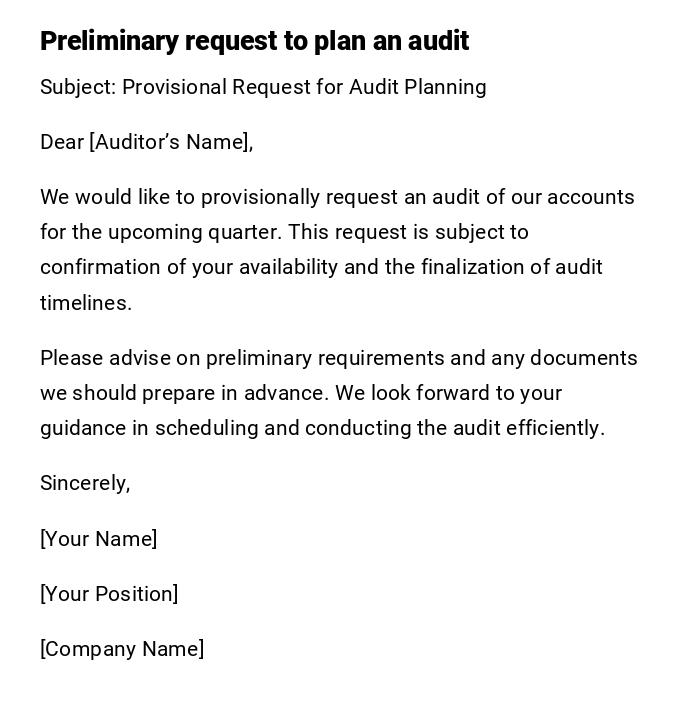
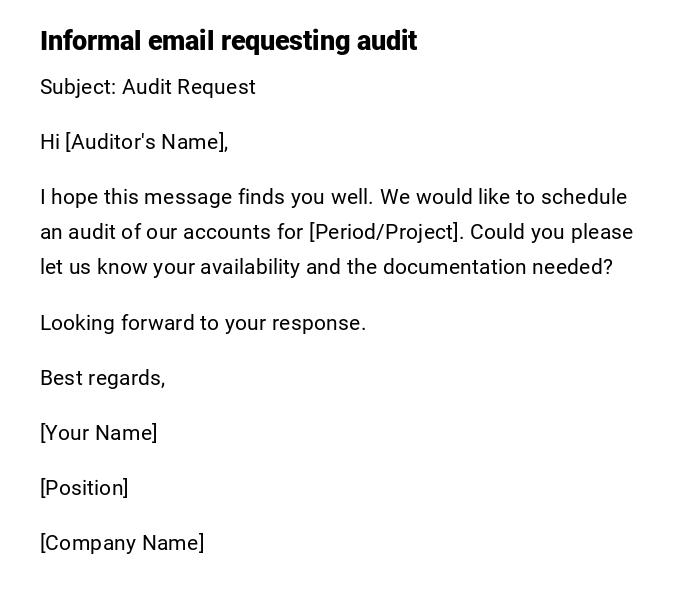
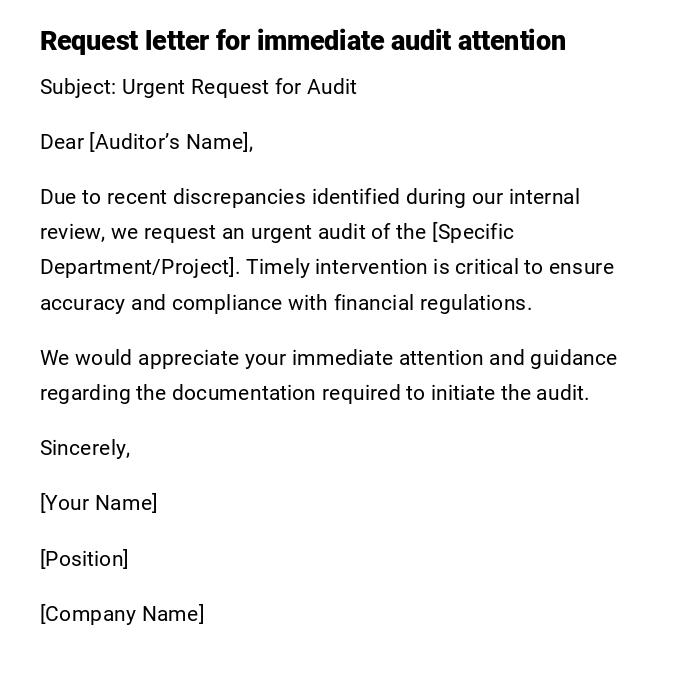
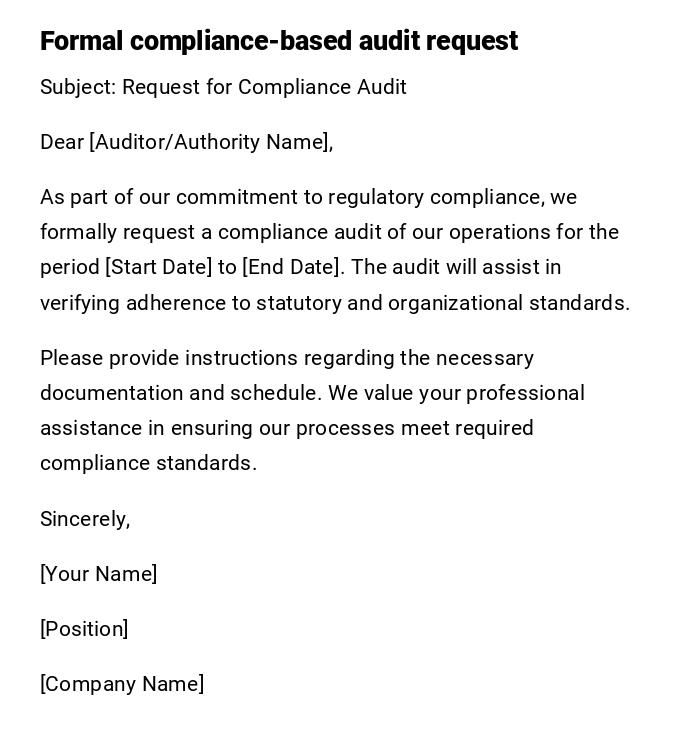
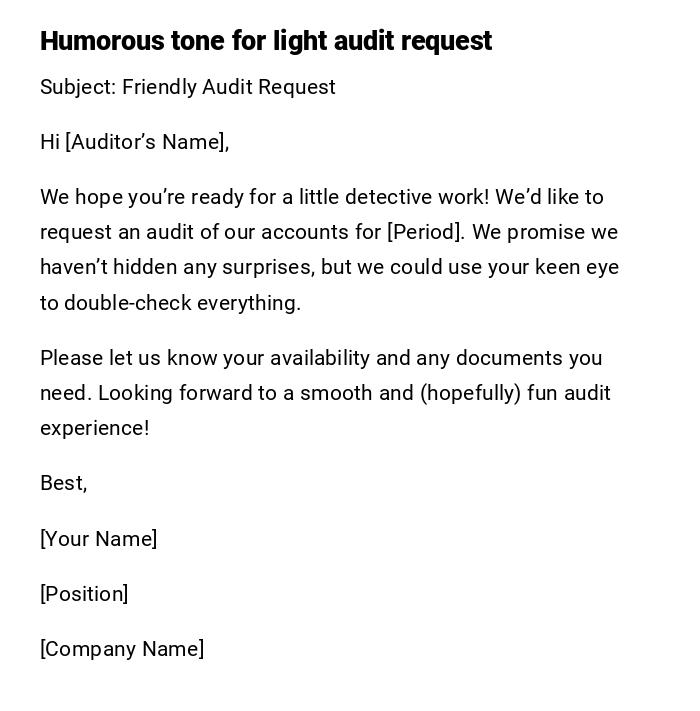
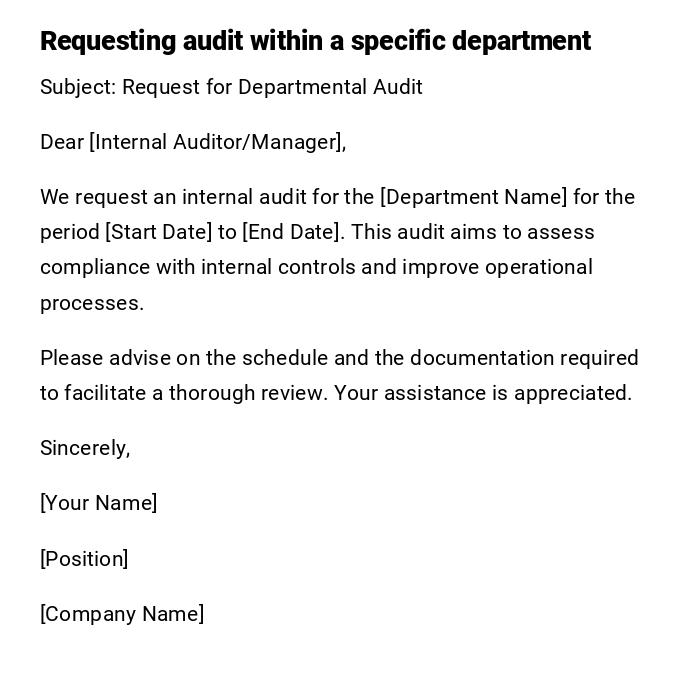
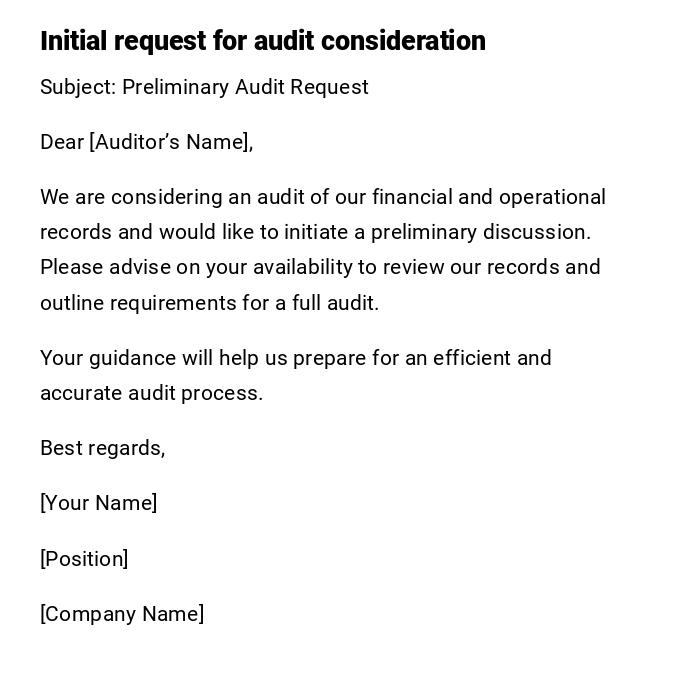

 Download Word Doc
Download Word Doc
 Download PDF
Download PDF